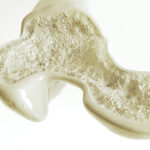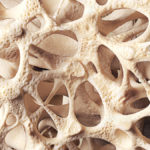By Bonnie Jenkins, Advanced Natural Wellness
After a recent bone density scan, my doctor delivered the bad news. It turns out that I have osteopenia, the precursor to osteoporosis. Not surprisingly, the next words out of the doctor’s mouth were “Do you take calcium?”
Calcium is thought to be the primary nutrient needed by our bones. It’s wisdom that’s been drummed into our heads for years by doctors, advertisers and even our mothers. But the latest research shows that our bones need more than just calcium. It turns out the way we eat, along with our lifestyle choices and stress level, can actually contribute to bone depletion, no matter how many calcium supplements we take or glasses of milk we drink. So what should we be taking along with calcium to protect our bones? Vitamin D, magnesium, manganese, soy isoflavones, phosphorus, potassium, boron, silica, copper and zinc are all needed to enhance bone strength. But recent studies point to another nutrient that our bones desperately need: Vitamin K.
Open your arteries, improve blood flow for a new health miracle...
Did you know your circulatory system has over 60,000 miles of arteries, veins and other blood vessels, if stretched end to end?
But as you age, your blood vessels undergo changes, which may cause them to stiffen, thicken and get clogged.
GOOD NEWS! Doctors have now identified a “Miracle Molecule” inside your arteries that helps OPEN your arteries and IMPROVE blood flow.
It’s what Dr. Valentin Fuster calls it, "One of the most important discoveries in the history of cardiovascular medicine."To you, that means...
- Healthy blood pressure
- Sharper mind and memory
- Skyrocketing energy and muscular strength
- Increased pleasure and passion in the bedroom
- Improved circulation to every cell and organ in your body
Go here to discover a new natural way to significantly boost the levels of this miracle molecule in YOUR body NOW!
Vitamin K activates the conversion of a bone-building protein called osteocalcin that shores up bone tissue and reduces the likelihood of fractures. And several studies point to a link between K intake and hip fractures. Using data from the Nurse’s Health Study, Harvard researchers found that getting more than 109 mcg. of vitamin K daily reduced the risk of hip fracture over 10 years in more than 71,000 middle-aged women. Similarly, researchers have found a relationship between K and the incidence of hip fracture in a group of nearly 700 older men and women. Those who took in about 250 mcg. a day of vitamin K, from both food and supplements, experienced fewer broken hips than those who got only about 50 mcg. daily.
Are You Suffering From...
- Love handles and a pot belly
- Romance that isn't what it used to
- Forgetfulness and inattention
- Low (or no) strength and endurance
- A sex drive that's shifted into neutral...or worse
If so...you may have Mature Male Burnout. Click here to discover more about this unique condition and what you can do about it.
But that’s not all. A review that pooled the results of 13 studies concluded that people who took supplemental vitamin K suffered less bone loss and a whopping 80 percent fewer fractures than those who did not take extra K. These and other similar findings are encouraging. And yet, there’s no rush among doctors and researchers to anoint vitamin K as the new calcium for bones.
So why does the medical community go overboard over calcium? Because your body needs it. Calcium supports the structure and function of your bones and your teeth. So, the logic goes, since your body needs a lot of calcium, you should consume lots of high calcium foods like dairy. But here’s where that theory breaks down: Think of calcium as the bricks in a brick wall of bones. Bricks are essential, for sure, but without enough mortar—which comes in the form of the other nutrients I’ve mentioned—the wall can’t hold itself up. So, yes, you do need calcium, but you also need an assortment of other bone-building nutrients. Here’s a breakdown of what you should be getting:
| Nutrient | Daily Dosage | Food Sources |
| Calcium | 1,200 to 1,500 mg. | Spinach, greens, romaine lettuce, rhubarb, broccoli, cabbage, summer squash, green beans, tofu, Brussels sprouts, oranges, asparagus and yes, milk |
| Phosphorus | 700 to 1,200 mg. | Beans and nuts |
| Magnesium | 400 to 800 mg. | Potatoes, soy foods, seeds, nuts, beans, bananas, oranges, tomatoes, leafy greens |
| Silica | 5 to 20 mg. | Coffee, fruits, vegetables |
| Zinc | 20 to 30 mg. | Beans, peanuts |
| Manganese | 10 to 25 mg. | Avocados, seeds, nuts (especially pecans and hazelnuts) |
| Copper | 2 to 3 mg. | Beans, raisins, nuts |
| Boron | 3 to 4 mg. | All fruits and vegetables |
| Potassium | 4,700 to 5,000 mg. | Fruits and vegetables (especially potatoes, bananas, prunes, raisins, spinach, acorn squash) |
| Vitamin D | 1,000 to 2,000 IU | Mushrooms |
| Vitamin K | 1,000 mcg. | Lettuce, spinach, chard, cabbage, broccoli, collard greens, turnip greens |
| Soy Isoflavones | 50 to 100 mg. | Soybeans, tofu, miso, soy milk, processed soy foods |
Don’t forget that weight-bearing exercise, which requires your bones to support your weight, is at least as important as these bone-strengthening supplements. Studies show that 30 to 60 minutes of daily moderate exercise—walking, gardening, even dancing—substantially reduces your risk of fractures.
Remember, consuming lots of calcium but not exercising and ignoring the other bone beneficial nutrients is like building a brick wall without enough mortar. The wall may look strong, but it isn’t.
References:
Atkins GJ, et al. Vitamin K promotes mineralization, osteoblast to osteocyte transition and an anti-catabolic phenotype by {gamma}-carboxylation dependent and independent mechanisms. American Journal of Physiology. Cell Physiology. 2009 Aug 12. [Epub ahead of print]
Cranney A, et al. Effectiveness and safety of vitamin D in relation to bone health. Evidence Report/ Technology Assessment (Full Rep). 2007;(158):1-235.
Maïmoun L, et al. Effect of Physical Activity on Calcium Homeostasis and Calciotropic Hormones: A Review. Calcified Tissue International. 2009 Sep 16. [Epub ahead of print]
Wong WW, et al. Soy isoflavone supplementation and bone mineral density in menopausal women: a 2-y multicenter clinical trial. American Journal of Clinical Nutrition. 2009 Sep 16. [Epub ahead of print]






